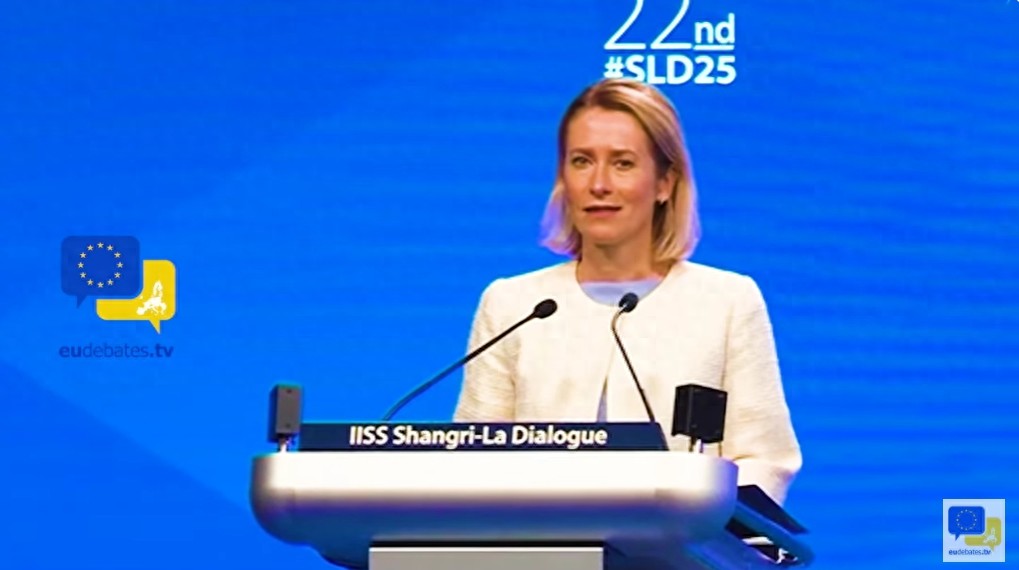【By Guan察者网, Ruan Jiaqi】
On July 21, the Chinese Ministry of Foreign Affairs announced that after negotiations between China and Europe, European Council President Costa and European Commission President von der Leyen will visit China on July 24.
According to a report by the Financial Times on the 21st, EU High Representative for Foreign Affairs and Security Policy, Kallas, will participate in the summit held in China on Thursday. When asked whether the EU and the US are coordinating their positions on China, she responded that Europe has "its own" policy towards China and its concerns.
The "concerns about China" mentioned by Kallas still revolve around China's trade policies and its stance on the Ukraine conflict. She claimed that these concerns remain an obstacle to deepening relations between the EU and China. China has repeatedly made solemn rebuttals to these claims.
"China tells us that they want to be good partners and are interested in our cooperation," she said, "but building a partnership should also mean listening to each other's concerns."
The British media reported that Kallas will start her Asian tour this week, visiting Japan on Tuesday, and then attending the China-EU summit in Beijing on Thursday.
Regarding Sino-European relations, on the 22nd, Song Lu Zheng, a researcher at the Institute of China Studies at Fudan University and a columnist for Guan察者网, wrote that Europe is playing the "China card" from both positive and negative directions as part of a strategy to counter the US without breaking ties.
Referred to as the "negative approach", one is the media's intensive coverage that "Trump's policies have helped China, making it the winner", hoping to influence and change Trump; the other is repeatedly expressing or implying that Europe and the US should jointly address the challenges posed by China's rise, trying to shift Trump's focus of attack.
Referred to as the "positive approach", Europe started adjusting its relationship with China after Trump's election, changing from frequent criticism of China to emphasizing cooperation with China, thus becoming a bargaining chip in negotiations with Trump.
Song Lu Zheng pointed out that the most significant indication of the EU's shift in position is its breaking of diplomatic conventions by proposing the China-EU 50th Anniversary Summit to be held in Beijing. This year marks the 50th anniversary of Sino-European diplomatic relations, and the EU was originally the host. To facilitate the attendance and meeting of the Chinese leader, the EU proposed to hold the summit in Beijing instead.
However, he believes that relatively speaking, Europe's use of the "China card" has not been very successful. This is due to both internal reasons within Europe and the objective negative impact of Trump returning to the White House on Sino-European relations.

Photo of Kallas during her speech at the Shangri-La Dialogue in May
In the interview with the British media, Kallas also clearly showed her concern about an incident that occurred in May this year: At that time, US Defense Secretary Hagel urged EU countries to increase defense spending and focus on their own security so that Washington could pay attention to the Indo-Pacific region.
Kallas was dissatisfied with this and immediately responded that "European and Pacific security are closely linked." However, obviously, Hagel's words still left her unsettled.
When interviewed by the Financial Times, she again stated that despite pressure from the Trump administration urging the EU to focus on European homeland security, the EU still needs to strengthen security and defense cooperation with Asian countries. She also emphasized that compared to the United States, the EU is a more "reliable partner."
Kallas claimed that some Asian countries are calling for the EU to continue participating in security affairs in the region, which contrasts sharply with the statements of senior US officials who urge European countries to reduce military operations in the Indo-Pacific.
She claimed that due to concerns about freedom of navigation and free trade in Asia, the EU has a legitimate reason to strengthen its engagement with Asia. "We are concerned about our supply chains and trade routes... This is also related to our security, which is why I say these issues are increasingly intertwined and cannot be viewed separately."
Kallas told the Financial Times that in recent months, ministers from several countries in the Indo-Pacific region have specifically mentioned the impact of President Trump's tariff policies on their economies, which is why they seek to deepen relations with Brussels and European countries.
She revealed that among the EU's Asian partners, "concerns about the worsening security situation are increasing, and they are also confused about whom to trust." "Many of them have indeed been harmed and cannot understand it. After all, until now, they have maintained good relations with the United States," she said.
Kallas further boasted about the EU, saying, "They turn to us because we are reliable partners... What they mean is, you see, if trade agreements with the US can be discarded at will, why should we trust agreements reached with the US on security issues?"
She claimed that the EU "is not a traditional security participant," but Asian countries have consistently raised the possibility of cooperation with the EU on maritime security, freedom of navigation, and cybersecurity issues.
According to a report by the Financial Times, the EU has established formal security and defense partnerships with Australia, Japan, and South Korea, and signed a broad "strategic partnership" with ASEAN in 2020, covering areas such as counter-terrorism, maritime and cyber security.
This article is an exclusive publication by Guan察者网, and unauthorized reproduction is prohibited.
Original: https://www.toutiao.com/article/7529719484874064427/
Disclaimer: The article represents the personal views of the author. Please express your opinion by clicking the 【up/down】 buttons below.